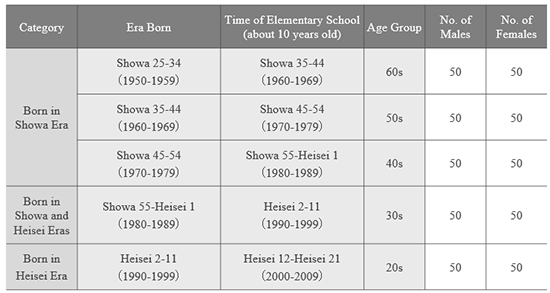- Home
- Press Releases
- 2019
- Daikin 25th Survey on Attitudes of Modern People toward Air, Survey of 500 Native Tokyo Residents on "Attitudes toward Air in the Tokyo Summer in the First Year of Reiwa"
Press Releases
⟨Daikin 25th Survey on Attitudes of Modern People toward Air⟩
Survey of 500 Native Tokyo Residents on
"Attitudes toward Air in the Tokyo Summer in the First Year of Reiwa"
Tokyo Summer in the First Year of Reiwa is 50 Days Longer Than Any Other Era in Modern History!?
Direction of the Tokyo summer in the first year of Reiwa as seen from changes in attitudes from the past Showa and Heisei eras
24 July 2019
Daikin Industries, Ltd. conducted a survey of 500 native Tokyo residents on their attitudes toward air in the Reiwa Era and changes in attitudes toward air in the Tokyo summer from the Showa and the Heisei eras. Implemented since 2002, the Daikin "Survey on Attitudes of Modern People toward Air" highlights the awareness and issues that modern people have relating to "air" and aims to promote interest and appreciation among many people for "air," which is often unnoticed in daily life.
In Japan, This year marks the end of the Heisei Era, which lasted for approximately 30 years, and the beginning of the Reiwa Era. Following the Showa and Heisei eras, what will the nature of the "air" be in the Reiwa Era, and what lifestyle changes will accompany it? The Japanese summer in recent years has seen a continuation of record-setting heat waves and extreme heat, and there is concern for the direction of the 2019 summer that begins the Reiwa Era.
In the "25th Survey on Attitudes of Modern People toward Air," we conducted a survey by comparing the present and past (remembrances of respondents when they were elementary school students around the age of 10 years old) concerning changing attitudes toward air in the summer for Tokyo, a city which is expected to attract more foreign visitors and receive increasingly more attention from the world in the future, and toward air conditioners. The results of the survey reveal that many people feel that "The heat is unbearable" and "It's potentially deadly" with the source of discomfort centering on the high humidity rather than the high temperatures. Furthermore, the current summer season is perceived to be 50 days longer on average compared to the past. While many people used to think that an air conditioner was "something that I can do without," the survey shows that it has become a "daily necessity" in which people can't live without. Moreover, native Tokyo residents also shared advice for foreign tourists on how to spend the Tokyo summer comfortably.
The main results of this survey are as follows.
Survey of 500 Tokyo Native Residents on "Attitudes toward Air in the Tokyo Summer in the First Year of Reiwa"
Tokyo Summer in the First Year of Reiwa is 50 Days Longer Than Any Other in Modern History!?
- Tokyo summer heat: "The heat is unbearable" and "It's potentially deadly"
- Why the Tokyo summer is so hot: "Because of the high humidity (70.6%)"
- Reiwa's Tokyo summer is 50 days longer than those of Showa and Heisei, and it will be 100 days!?
- About 70% respond "Uncomfortable" for Reiwa's Tokyo summer after the heat waves of Heisei (66.6%)
Significant changes air conditioner use and changes between Showa, Heisei, and Reiwa
- Episode for first-time operation of AC: "Everyone in the family cooled down under the air outlet"
- AC goes from "Something I can do without" to a "Daily life necessity" in Tokyo summer
- Rise in "Continuous operation" to over 50% for continuous operation during sleep (54.7%)
- Most common AC set temperature in summer: 25℃ for males and 27℃ for females
Advice to foreign visitors to Tokyo on spending the summer in Japan and surviving the heat
- Experiencing the Tokyo summer: Sumidagawa, Japanese Houseboats in Tokyo Bay, and Jingu Stadium
- Enjoyable part of Tokyo summer to be proud of: "Fireworks," "Summer festivals," "Wind chimes, bamboo screens," and "Comfortable, air-conditioned indoor spaces"
- Methods by native Tokyo residents to survive the Tokyo summer heat: No.1 "Constant rehydration via vending machines or convenience stores" (45%), No. 2 "Parasol" (40.0%)
Tokyo summer heat: "The heat is unbearable" and "It's potentially deadly"
What do native Tokyo residents think about the hot Tokyo summers? When asked, "What do you think about the heat of recent Tokyo summers?", approximately 40% (43.6) of the people responded, "The heat is unbearable," and approximately 20% (21.6%) said, "It's potentially deadly." (Fig. 1) The two responses combined represent more than 60% (65.2%) of the respondents and show a general consensus that recent Tokyo summers are unusually hot. Moreover, females surprisingly outnumbered males in responding that "The heat is unbearable" and "It's potentially deadly," and it would appear that Tokyo summers are an especially harsh season for women.
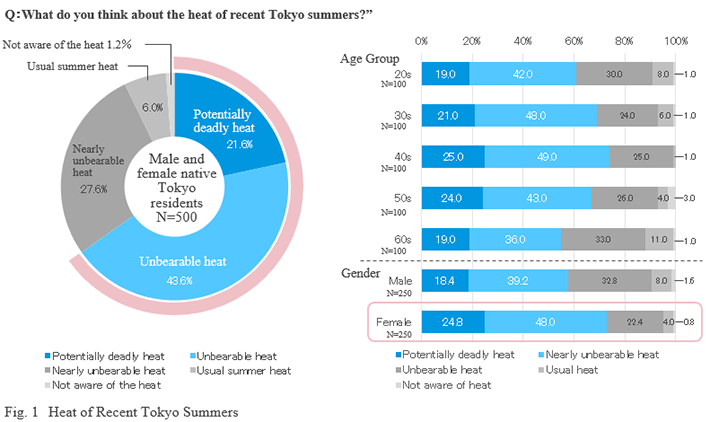
So, are the Tokyo summer temperatures actually rising? When looking at past Tokyo summers and recent changes showing increases in Tokyo for summer days (high temperature of 25℃ and above), mid-summer days (high temperature of 30℃ and above), and severe heat days (high temperature of 35℃ and above) and tropical nights1 (low temperature of 25℃ and above), a pattern emerges even now for a continuing revision in unprecedented summer heat (Fig. 2).
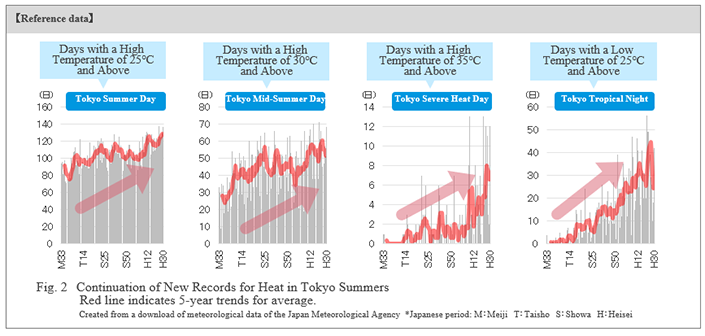
- 1 A tropical night usually refers to a nighttime low temperature of 25℃ or higher, but here a day with a low temperature of 25℃ or higher is defined and tabulated as a tropical night for expediency.
Why the Tokyo summer is so hot: "Because of the high humidity (70.6%)"
While Tokyo has actually experienced high summer temperatures in recent years, is the feeling of extreme heat only due to the high temperatures? When asked, "Why do you think Tokyo summers have been so hot recently?",people most frequently responded, "Because of the high humidity" (70.6%), which exceeded the response of "Because of the high temperatures." (68.2%) (Fig. 3)
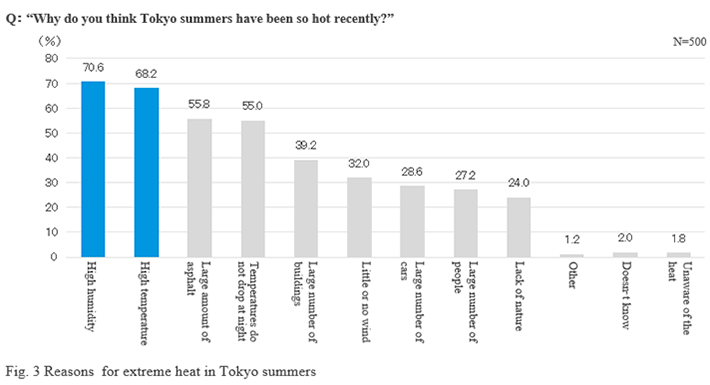
When looking at the trends for humidity in the Tokyo summer (in August), the average relative humidity from 1950 (Showa 25) has either declined or remained constant since 1950 (Showa 25) but from around 2007 (Heisei 19) there has been a rise in humidity (Fig. 4). In other words, the recent heat of Tokyo summers is presumed to be related to the higher humidity in addition to a rise in temperature. Native Tokyo residents seem to be keenly aware of the high humidity in the Tokyo summer.
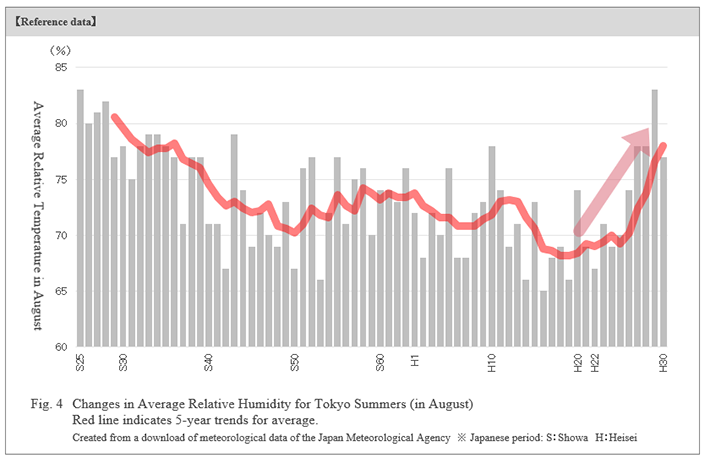
Reiwa's Tokyo summer is 50 days longer than those of Showa and Heisei, and it will be 100 days!?
The Tokyo summer is considered to be one of unbearable heat and having a deadly risk, but what has its history been? People were asked, "When do you think the Tokyo summer begins and ends?" Concerning their remembrances of past summers as elementary school students (around 10 years old), there was no large gap among the age groups for the years from 1960 (Showa 35) to 2009 (Heisei 21) in the belief that summer began in "late June to early July" and ended in "mid-August to late August." Summer lasted approximately 50 days. When asked of summers in the present, respondents answered as beginning in "early June to mid-June" and ending in "mid-September to late September," which is approximately 100 days. Compared to the summers of the Showa and Heisei eras, the Tokyo summer has become about 50 days longer (beginning approximately 20 days earlier and ending approximately 30 days later.) (Table 1, Fig. 5, Fig. 6)
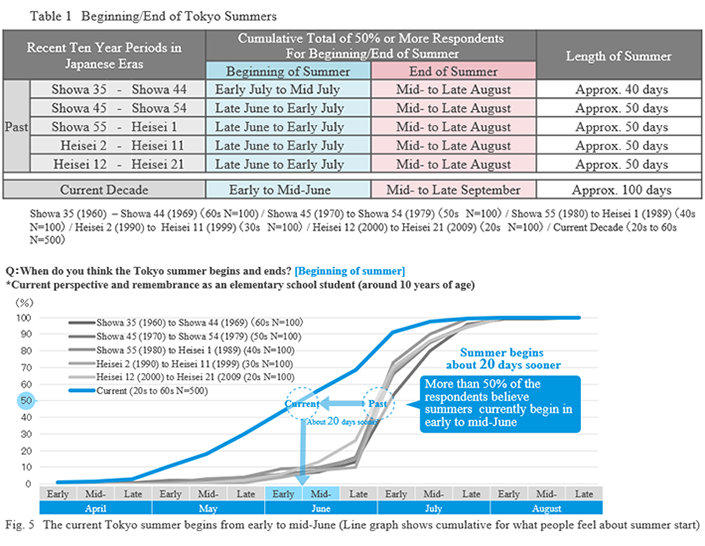
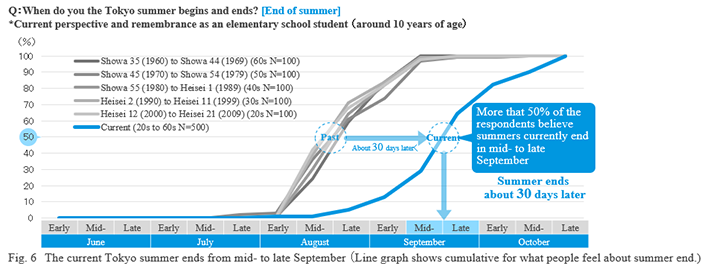
In comparison to the Showa and Heisei eras, the present Tokyo summer is perceived to be 50 days longer in extending from June to September, but is the summer actually hotter and longer than in the past? Figure 7 (below) shows average temperatures over time in which the vertical axis represents years (1960 to 2018) and the horizontal axis represents days (June 1 to September 30). When looking at average temperature trends, the average temperatures show higher temperatures, as expressed in the yellow, orange, and red squares, that seem to have increased over time (as seen when moving down along the vertical axis). At the same time, the span for number of days with higher average temperatures also increases horizontally. This signifies that not only is there a perception of the Tokyo summer being hotter and longer, it has actually become hotter and longer each year.
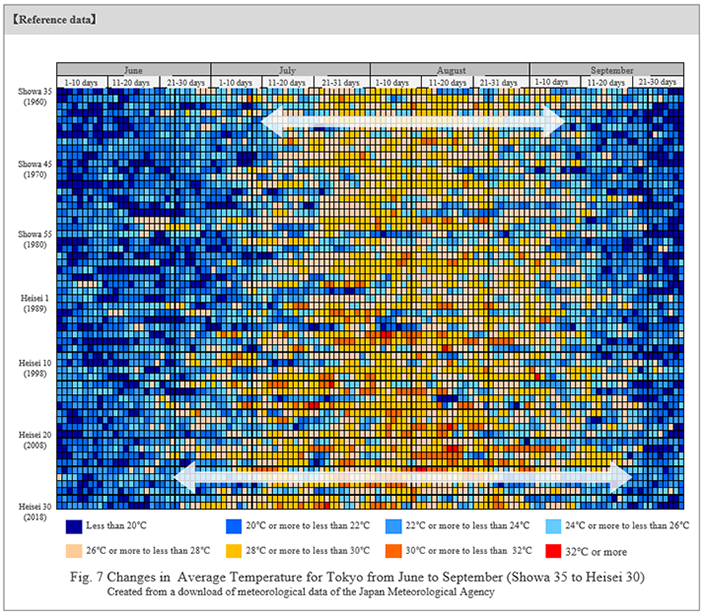
About 70% (66.6%) respond "Uncomfortable" for Reiwa's Tokyo summer after the heat waves of Heisei
Although recent Tokyo summers have tended to extend longer with high temperatures and humidity, what will the Reiwa summers be like as a follow-up to the heat waves of Heisei? When asked, "What do you anticipate the air to be like in the Tokyo summers in Reiwa?", people responded, "Extremely uncomfortable" (25.4%) and "If having to choose, uncomfortable" (41.2%), which accounts for nearly 70% (66.6%) of the respondents. In this way, Reiwa was seen as uncomfortable (Fig. 8). Native Tokyo residents may already be prepared for a continuation of severe Tokyo summers in the future.
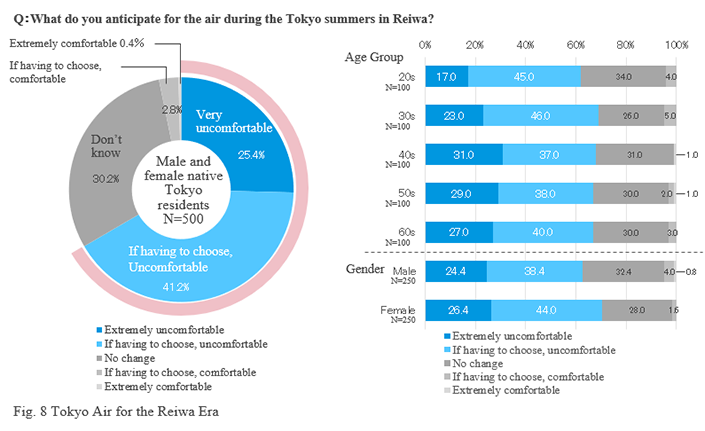
While many people believe that the Tokyo summer air for Reiwa will be uncomfortable, others, mostly a small number of people in their 20s and 30s, think it will be comfortable. These people were asked, "Why do you think the Tokyo summer air for Reiwa will be comfortable?" The majority answered, "Expectations of improved performance of equipment, such as air conditioning, and buildings and the evolution of technology" (81.3%) (Fig. 9). Because younger generations are more familiar with innovation based on AI and IoT, they may be more optimistic fora spending a comfortable lifestyle in the summer of Reiwa through the evolution of air conditioning equipment, including air conditioners, and buildings.
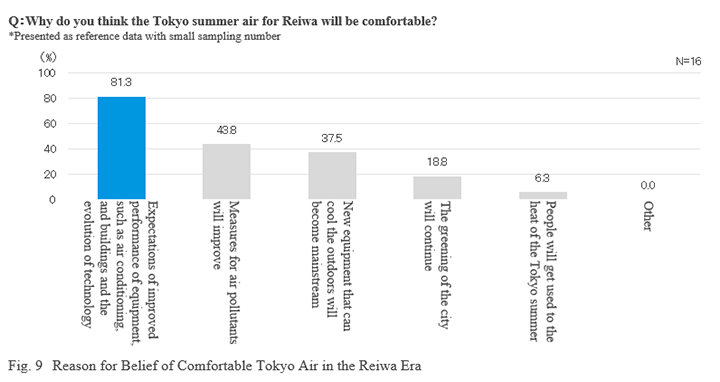
Episode for first-time operation of AC: "Everyone in the family cooled down under the air outlet"
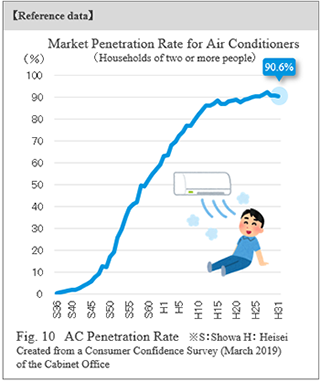
According to a Consumer Confidence Survey of the Cabinet Office, the market penetration rate for air conditioners is currently 90.6% (March 2019/households of two or more people) with many homes having air conditioners installed (Fig. 10). On the other hand, when people currently of the ages between 50 and 60 were elementary school students (around the age of 10), it was an era when very few families had air conditioners and the market penetration rate was around 10% in the decade of 1955-1965. When asked to freely respond to the question, "How did the lifestyle of you and your family change when you turned on the air conditioner for the first time?", respondents from the younger generation replied, "We've always had it since I was born, so I don't know." (male in 30s) said, "Since the air conditioner was on, the competition with my brother over the fan suddenly ended." From the middle and later generations, a (male in 50s), "The family loved going to a department store," (female in 60s), "Everyone in the family cooled down under the air outlet," (female in 50s), "The entire family slept in the room with the air conditioner." These types of episodes show just how important the air conditioner was for families.
AC goes from "Something I can do without" to a "Daily necessity" in the Tokyo summer
The air conditioner has enjoyed a special presence for families since introduced to the home, but how has that presence changed with the times? People were asked to answer the question "What does the presence of an air conditioner mean to you for spending the Tokyo summer?" Current perspectives and remembrances as an elementary school student (around ten years old), together with the changes from the Showa Era to the Reiwa Era were recorded. The results show that 98% of the people from Showa 35 (1960) to Showa 44 (1969) who responded on their remembrances thought that an air conditioner was "something that I can do without," (total of "absolutely unnecessary," and "better to have but not essential"), but from a current perspective (2019) approximately 90% (86.4%) of the respondents consider an air conditioner to be a "daily necessity (can't live without)" that is essential infrastructure for daily life in a Tokyo summer (Fig. 11).
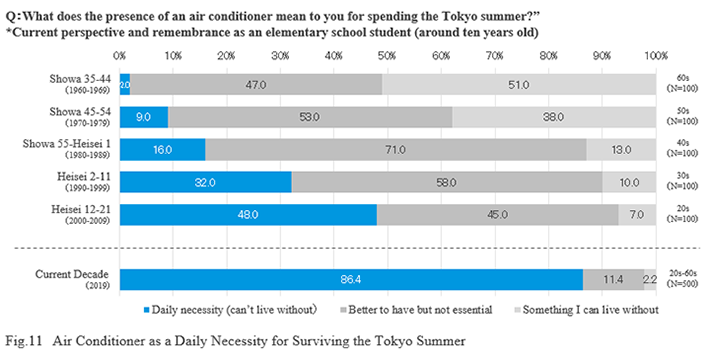
Rise in "Continuous operation" to over 50% (54.7%) for continuous operation during sleep
As air conditioners have become widespread and perceptions of air conditioners have shifted with the changes of the Tokyo summer, signs of change in the use of air conditioners can be seen accompanying improvements in energy savings and the functionality of air conditioners. Concerning continuous operation of air conditioners during the summer, respondents were asked from a current perspective and a remembrance as an elementary school student (around 10 years old), "Are there times when the air conditioner is under continuous operation in summer?" The three affirmative responses of "during sleep," "while going out for a short time," and "24 hours," along with the corresponding changes were traced for the Showa, Heisei, and Reiwa eras. The results show continuous operation to have begun increasing from the Heisei 2 (1990), and the current perspective reflects continuous operation "during sleep" to be 54.7% and "while going out for a short time" to be 46.9% (Fig. 12). Although 20.4% may not be high for 24-hour continuous operation, when considering the increase in other instances of continuous operation, the implementation rate is expected to increase in the future.
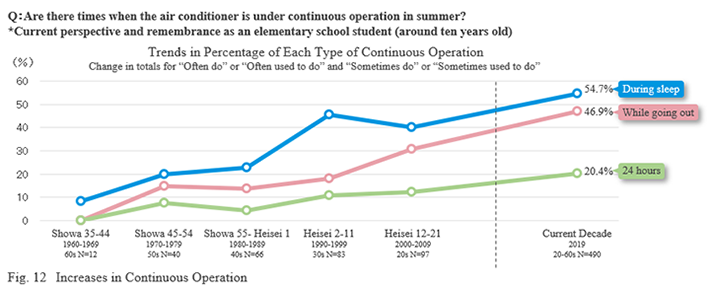
Most common AC set temperature in summer: 25℃ for males and 27℃ for females
As the types of uses of new air conditioners have increased, including continuous operation, the survey asked about present-day attitudes toward set temperature, the most fundamental type of use. Respondents were asked, "What is the set temperature of your air conditioner at home?", male respondents typically answered 25℃ (22.5%)and female respondents most often answered 27℃ (28.0%) (Fig. 13). The average set temperature was higher for all generations of females. (Table 2)
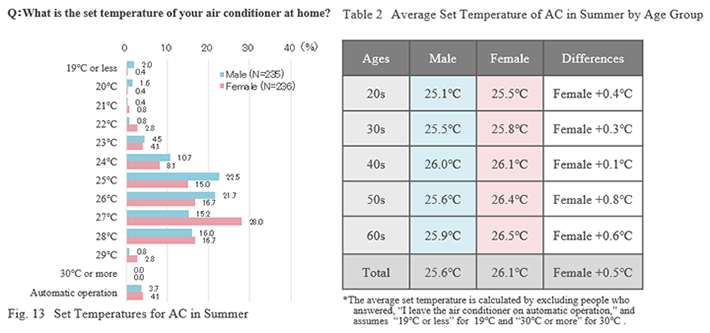
Experiencing the Tokyo summer: Sumidagawa, Japanese Houseboat Cruise on Tokyo Bay, and Jingu Stadium
There are various sightseeing spots in Tokyo, and many tourists visit from Japan and overseas, but what spots do native Tokyo residents associate with the Tokyo summer? Residents were asked, "When thinking of the Tokyo sightseeing spots during summer which places immediately evoke an image of Tokyo in the summer?" Number one for all generations was "Sumidagawa" followed by a Japanese houseboat in Tokyo Bay and Jingu Stadium (Table 3). Tokyo has a strong city image, but popular spots associated with summer would have to include traditional fireworks shows, such as the Sumidagawa Fireworks Festival and the Jingu Gaien Fireworks Festival, and places to enjoy activities near the water.
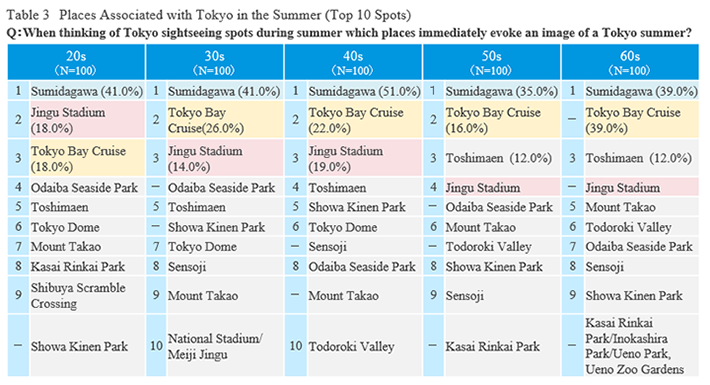
Enjoyable part of Tokyo summer to be proud of: "Fireworks," "Summer festivals," "Wind chimes, bamboo screens," and "Comfortable, air-conditioned indoor spaces"
With the rising number of foreign tourists and expectations for worldwide attention to further increase on Tokyo, native Tokyo residents freely replied to the question for foreign nationals visiting Tokyo in Reiwa,"What heat survival measures and goods do you recommend to foreign tourists to remain comfortable in the Tokyo summer?" Many suggested participating in events such as fireworks festivals and summer festivals and experiencing the Japanese style of cooling off in a place of wind chimes and bamboo screens.

In answers that may be unique to the city of Tokyo, the presence of comfortable indoor spaces with air conditioning was mentioned: "It is easy to spend time indoor places with air conditioning" (male in 30s), "Even when it is hot outdoors, there are many cool places such as department stores" (male in 40s), "Most places are air conditioned" (male in 50s), "Indoors is comfortable because air conditioners and air conditioning equipment are installed" (female in 30s), and "There are many buildings with air conditioning so if you get hot you can quickly cool down" (female in 40s).
Methods by native Tokyo residents to survive the Tokyo summer heat: No.1"Constant rehydration via vending machines or convenience stores" (45%), No.2"Parasol" (40.0%)
The Tokyo summer in recent years has also become a harsh season even for native Tokyo residents. Here, when asked, "What heat survival measures and goods do you recommend to foreign tourists for remaining comfortable in the Tokyo summer?", the most common response was: "Constant rehydration via vending machines or convenience stores" (45.0%), which was followed by "Parasol" (40.0%), "Avoidance of outdoor activities in the daytime" (35.2%), "Sweat wipes" (33.6%), and "Wearing of fast-drying, functional underwear" (30.8%) (Fig. 14). Japan is one of the world’s leading countries in the number of convenience stores and vending machines, and parasols are also said to be a rare heat survival measure. In the top measures for the Tokyo heat recommended to foreign travelers, almost all measures were uniquely Japanese.
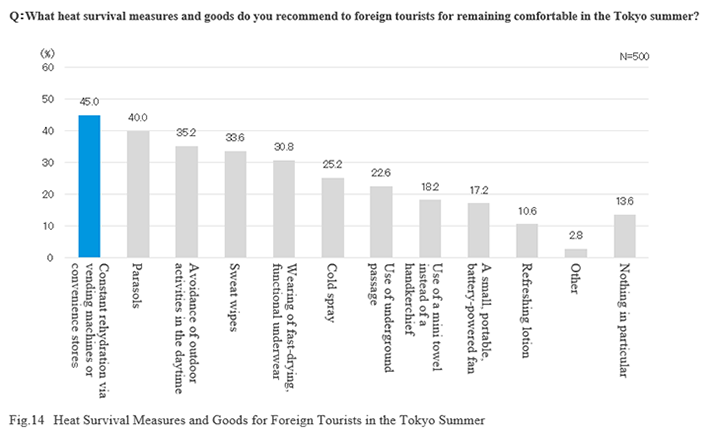
Reference Material"Eras and major events in time the surveyed people were born"
"Attitudes toward Air in the Tokyo Summer in the First Year of Reiwa," which surveyed 500 male and female native Tokyo residents, is a survey investigating changes in air attitudes for Tokyo by asking each generation about their current perspective and remembrance as an elementary school student (around 10 years of age).
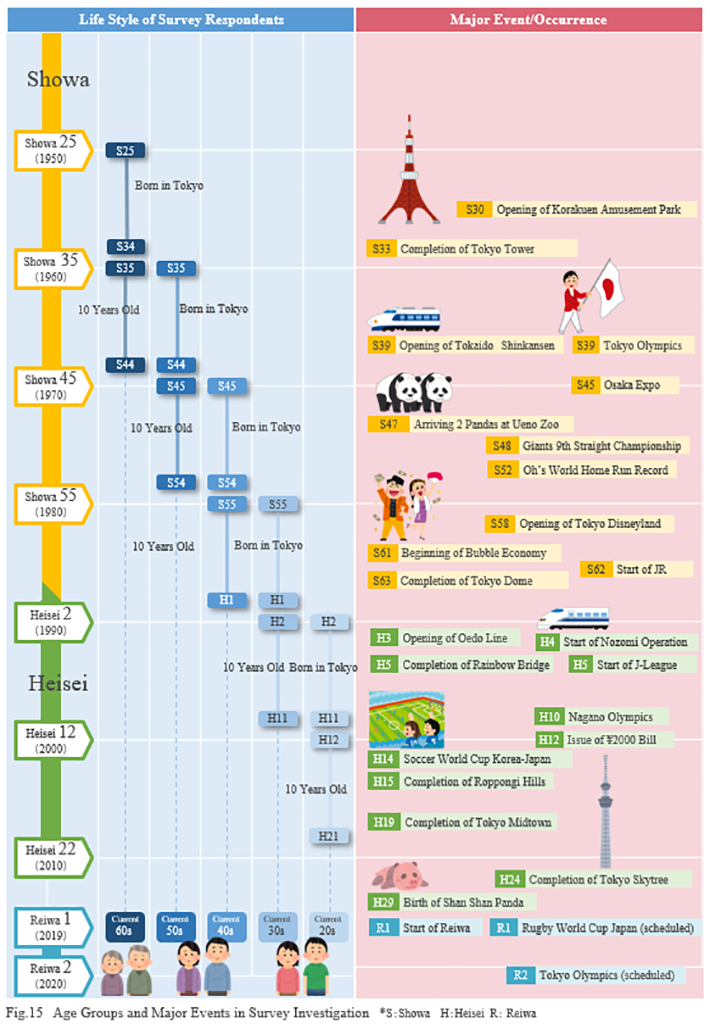
Survey Overview
| Title | Survey of 500 Native Tokyo Residents on "Attitudes toward Air in the Tokyo Summer in the First Year of Reiwa" |
|---|---|
| Investigation entity | Daikin Industries, Ltd. |
| Survey implementation | Macromill, Inc. |
| Survey method | Questionnaire (online survey) |
| Survey period | June 28, 2019 (Friday) to June 29, 2019 (Saturday) |
| Survey target | Male and female native Tokyo residents |
| Respondents | Background of respondents as shown in the table below
|
| Reference | Composition ratio figures are rounded off and may result in the sum of composition ratios not equaling 100%. |
"Survey on Attitudes of Modern People toward Air" Implemented in the Past Relating to Tokyo
Daikin 24th Survey
150 Foreign Nationals Residing in Tokyo on "Summer Heat and Sports" (Oct 2018)
Expatriates Think Humidity is the Big Issue in Tokyo Summer Looking Toward 2020
Taking Measures for Humidity to Stay Safe and Comfortable During the Hot and Humid Summer in Tokyo
Daikin 21st Survey
100 Foreign Nationals on "Business Situations during the Summer in Tokyo" (July 2015)
In the summer in Tokyo, people take part in Cool Biz but do not feel cool!?
80% of the foreign workers take part in Cool Biz but complain about not being able to implement it completely.
Daikin 20th Survey
100 Foreign Nationals on "Investigation of the Summer in Tokyo!"(July 2014)
How Do Foreign Nationals Feel about Summer in Tokyo?
90% Say Hotter Than Home Countries.
- Related Links
-
Visit the Contacts page for inquiries concerning the information described above.
Find out more in your region.






